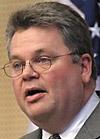Nickels accuses strip clubs of links to organized crime

With a public vote approaching on regulations for Seattle strip clubs, Mayor Greg Nickels this week sharpened his rhetoric against the clubs, accusing them of connections to organized crime.
Nickels linked the clubs to organized crime during a Wednesday call-in show on the city cable-television channel. Responding to a question about a proposal to permit new strip clubs in an industrial area south of downtown, Nickels veered into a broad indictment of the clubs and their owners, particularly Rick's strip club in Lake City.
"The clubs don't make their money off of Pepsi. ... I believe that there is organized crime involved in at least that club and perhaps others, and I don't want to encourage a lot more of them in my city," Nickels said.
Nickels cited the 2003 Strippergate scandal, in which people connected with Rick's, including owner Frank Colacurcio Jr. and his father, Frank Colacurcio Sr., were accused of funneling thousands of dollars in illegal campaign contributions to three City Council members. No one has been convicted of any criminal charges in that case.
Pressed by the call-in show host, C.R. Douglas, on the allegation of "organized crime," Nickels said, "Strippergate, I think, is a pretty good example of that. And there are others." Nickels did not offer other specific examples.
John Wolfe, an attorney representing Colacurcio Jr., said Friday that Nickels shouldn't make unfounded accusations.
"Given my perception of Mayor Nickels' careful and deliberate style as a public official, I was surprised to hear his allegation. I think it is incumbent on him as a responsible public official to come forward with any evidence he has to support it, and if not, to retract it and apologize," Wolfe said.
But Nickels on Friday stood by his characterization. He also noted that strip-club owners already have poured $586,000 into a campaign to overturn strict new limits on conduct inside strip clubs.
"If that's not a record, it's damn close," Nickels said. All of the money has come from Seattle's strip-club owners, mainly Rick's and Déjà Vu, which has a club near Pike Place Market.
Deputy Mayor Tim Ceis did offer a slight clarification, saying "people have to be careful they don't connote organized crime with the Mafia. This is not La Cosa Nostra. But we are talking about a pattern with owners of Rick's that indicates they're not exactly law-abiding citizens."
In the Strippergate case, prosecutors charged Colacurcio Jr. and Sr. and two associates with causing false campaign-finance reports to be filed as a result of the alleged campaign-fundraising scheme.
The charges were dismissed in February when a judge ruled that state law governing campaign financing does not permit criminal charges. Prosecutors have appealed that ruling.
The Strippergate case drew interest from the FBI, which has looked broadly into the activities of the Colacurcios.
But no criminal case has been developed as a result of that inquiry, said a federal law-enforcement official, speaking on condition of anonymity because the bureau doesn't publicly discuss its investigations.
Nickels said he had not been briefed by the FBI on its investigation and offered no new information linking the Colacurcios to criminal activity.
The Colacurcios have been the target of law-enforcement investigations for decades. Colacurcio Sr. and Jr. both have served time in federal prison for evading taxes on cash skimmed from strip clubs.
The referendum being pushed by the Colacurcios and other strip-club owners this year would overturn a new city ordinance that clubs say will drive them out of business.
The ordinance includes a ban on direct tipping of dancers and a "four-foot rule" to keep dancers separated from patrons.
The campaign to overturn it has collected enough signatures to make the ballot, but the City Council has not decided whether to schedule it for the September primary or the November general election.
Tim Killian, campaign manager for Seattle Citizens for Free Speech, the strip-club-funded effort to overturn the rules, said the clubs have every right to fight the city law.
"It's not unreasonable for these clubs to try and protect their legitimate business purposes," Killian said. "All the money that has been contributed to the campaign has been legally accounted for."
Staff reporters Bob Young and Steve Miletich contributed to this report. Jim Brunner: 206-515-5628 or jbrunner@seattletimes.com